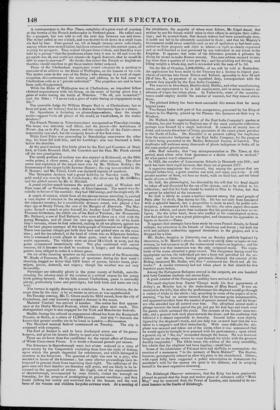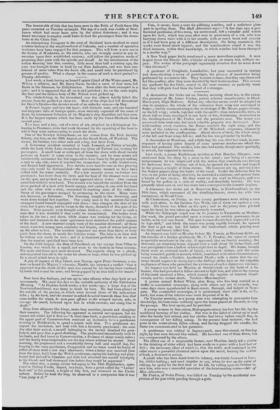The Edinburgh Observer announces, that the King has been graciously
pleased to permit that the huge and useless piece of ordnance called "Mons Meg," may be removed from the Tower of London, and restored to its ancient honours in the Castle of Edinburgh.
The lowest ebb of tide that has been seen in the Frith of Forth these fifty years occurred on Tuesday se'nnight. The top of a rock was visible at New haven which had never been seen by the oldest fisherman ; and it was found necessary to employ small boats to land the passengers from the steamboats at the Chain Pier.
An enterprising Company in the west of Scotland have resolved to erect a cotton factory in the neighbourhood of Calcutta, and a number of operative workmen have been engaged for that purpose. This will form a new era in the history of H:ndostan, as the natives, who are strongly averse to any innovation upon their established customs, still follow the primitive mode of preparing their yarn with the spindle and distaff. At the introduction of the cotton weaving into this country, little more than half a century ago, the yarn was brought home in hank by our East lndiamen, and was then con
sidered of more value than the finest silk, and could only be purchased by persons of quality. What a change in the course of such a short period:— Paisley Advertiser.
Last week, a boat, having on board Captain Lloyd of the Water-guard, Mr. Wilson a relative, and Mr. Barry Gunn, besides a crew of four men, left Beale in the Shannon, for Ballybunnion. Soon after the boat swamped in a gale ; and it is supposed that all on board perished ; for on the same night, the boat and the lifeless body of Mr. Wilson were picked up. The whale-fishing in the Greenland seas has almost totally failed this season, from the packed or close ice. Most of the ships had left Greenland for Davis's Straits—the dernier resort of an unlucky season—in May.
A French lugger and two tub boats, with thirteen men, and one hundred and forty-two tubs of foreign spirits, were recently captured off the coast of Kent, by Lieutenant Johnston of his Majesty's ship Ramillies and four men. It is the largest capture which has been made by the Coast Blockade these several years.
Two men and a boy, out of a crew of six, attached to a fishing-boat belonging to Penzance, were last week drowned, by the upsetting of the boat in which they were endeavouring to reach the shore.
One of the Newlyn fishing-boats, on her return from the Irish herring fishery, was lost, on the 20th August, on the Swash Bank, off Wexford. The owner, his brother, two other men and a boy, lost their lives. A distressing accident occurred at Loch Lomond, on Friday se'nnight, while the Lady of the Lake steam-boat was lying off Tarhett inn, waiting for passengers. A small boat or coble put off from the shore with about twenty persons on board : it came close to the steamer, and by some means not satisfactorily accounted for, but supposed to have been by the people making a rush to one side, when it touched the steam-boat, the coble heeled over, and floated keel uppermost. Few shrieks were heard—one or two piercing ones only could be distinguished—the unfortunates seemed to have been stifled with the water instantly. For a few seconds every on-looker was paralyzed ; but boats from the shore and the boat of the steamer were soon on the spot, and picked up those that appeared above water. One seaman saved fourwith his own hand. Two women who beheld the accident from the shore pushed off a boat with frantic energy, and oaring it, one with her hand and the other with a stick, succeeded in reaching some of the sufferers.
Some of the passengers escaped by swimming to the shore. Many were not, however, so fortunate. The drowning caught to the drowning, and went down locked fast together. One young man at the moment the boat swamped found himself entangled with three : they clung to the skirt of his coat, but it gave way, and he swam to the shore, denuded of this part of his dress. Nine persons were brought ashore lifeless ; others were in such a state that it was doubtful if they could be resuscitated. The bodies were taken to the inn ; and there, while dinner was cooking for the living, on tables and dressers in the same apartment were stretched the pallid corpses of the dead. A new-married couple were of the number drowned ; of those saved, were two young 'nen, comrades and friends, each of whom had given up the other as lost. The accident happened not more than thirty or fusty yards from the shore, in nearly five fathoms water. The lake is so clear that its bottom can easily be seen ; and it is therefore probable that no more than the number specified have been lost.
Ott the 23rd August, the Ross of Peterhead, on her voyage from Pillau to London, was struck by a squall, and went to the bottom in three minutes.
The mate and three men were drowned. The captain clung to a plank, • and supported himself in the water for about an hour, when he was picked up by a vessel which hove it, sight.
A jury of inquest at Hog Island, near Nassau, upon Peter Swanson, a seaman on board his Majesty's schooner, Nimble, has returned a verdict "that it appeared that the death of this man was caused by his having heen confined by cords tied round his arms, and being gagged by an iron bolt in his mouth.'



















 Previous page
Previous page